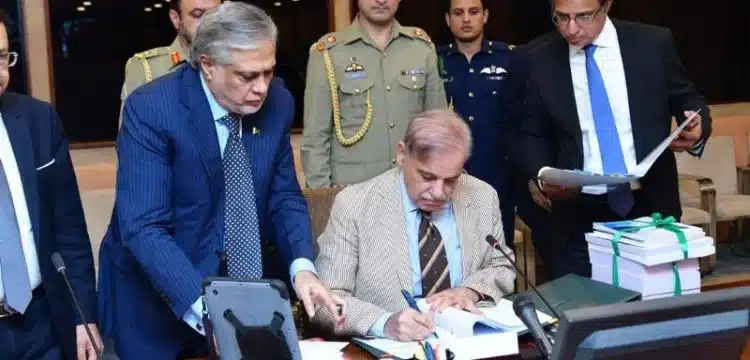[vc_row][vc_column][vc_column_text dp_text_size=”size-4″]In a last-ditch effort to secure essential funds, the administration has made various revisions to the budget for the coming fiscal year, including fiscal tightening measures mandated by the International Monetary Fund (IMF).
“Pakistan and the IMF had detailed negotiations for the last three days as a last effort to complete the pending review,” Finance Minister Ishaq Dar told the House on Saturday as he announced the modifications.
He stated that the government now intends to raise another Rs215 billion in taxes and cut spending by Rs85 billion in the next fiscal year, without cutting the federal development budget or government employee wages and pensions.
According to him, this will reduce the government’s revenue collection target to Rs9.415 trillion and total spending to Rs14.48 trillion. The provinces’ share would be enhanced from Rs5.28tr to Rs5.39tr.
وفاقی وزیر خزانہ اسحاق ڈار کا قومی اسمبلی کے بجٹ اجلاس میں اظہار خیال
امپورٹس کے حوالے سے پابندیاں ختم کی جا رہی ہیں pic.twitter.com/v3oGFAKQSK
— National Assembly 🇵🇰 (@NAofPakistan) June 24, 2023
He believed that these and other adjustments would “significantly reduce our fiscal deficit,” and stressed that the administration had ensured that the increased taxes would not hurt the poor.
Mr Dar also stated that the government had relaxed import restrictions imposed in December in order to reduce the current account deficit, which had been one of the IMF’s key concerns in releasing the cash.
He further stated that the funding for the Benazir Income Support Programme for FY24 has been reduced from Rs450 billion to Rs466 billion. The petroleum development levy would also be increased from Rs50 to Rs60 per litre.
The budget amendments occurred just a day after Prime Minister Shehbaz Sharif met with IMF Managing Director Kristalina Georgieva on the sidelines of the Global Financing Summit in Paris.
Also Read: Government raises PM House budget to Rs. 125 billion.
The Fund’s current lending programme, which was agreed upon in 2019, will expire on June 30. Under the ninth review of the $6.5 billion facility, which was signed earlier this year, the country has been attempting to secure $1.1 billion in funding, which has been blocked since November.
Mr Dar stated that for the previous few months, the nation had been wondering if the IMF’s ninth review would be effective or not, and that he wanted to reassure the people on the subject. “I hope, God willing, that we will have an agreement with the IMF,” he remarked.
Mr Dar proposed new revenue measures costing Rs223 billion when he presented the budget on June 9, in addition to the taxes worth Rs500 billion outlined in a mini-budget in mid-February. The total cost of new tax measures for the coming fiscal year is now Rs938 billion.
Based on predicted economic growth of 3.5 percent, average inflation of 21 percent, and tax measures, the government hopes to achieve a 28 percent increase in revenue for the upcoming fiscal year.
Revenue growth from GDP growth and inflation is expected to be Rs1.76 trillion in the upcoming fiscal year.
The budget’s overall outlay would now be Rs14.48 trillion.[/vc_column_text][/vc_column][/vc_row]











